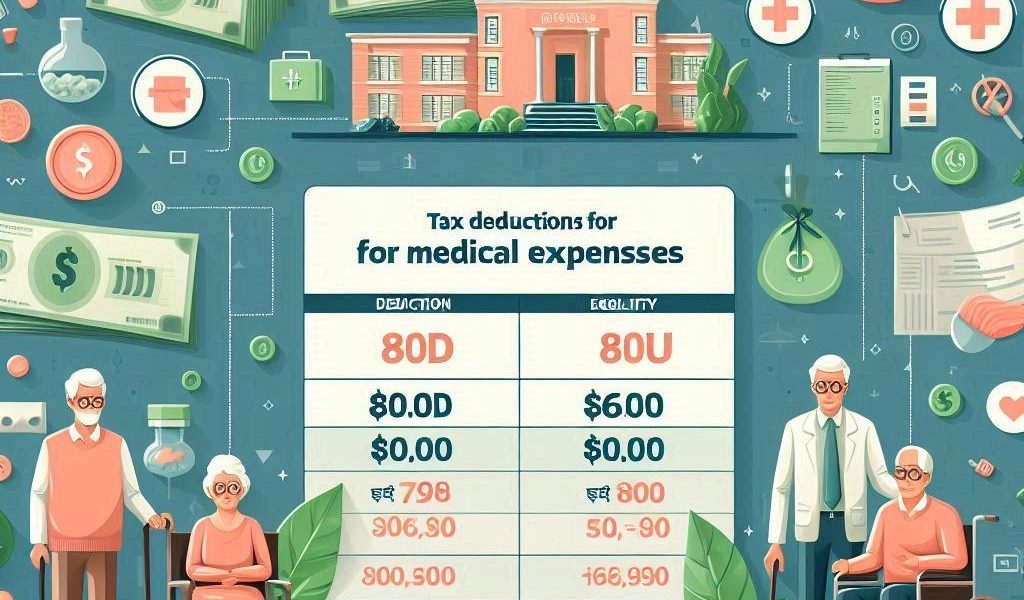Introduction
Medical expenses can be a significant financial burden, but the Indian Income Tax Act provides relief through various tax deductions. Sections 80D, 80DD, and 80U help taxpayers reduce their taxable income by allowing deductions on medical insurance premiums, expenses for dependents with disabilities, and self-disability claims.
In this guide, we will cover:
- What Section 80D, 80DD, and 80U entail
- Who is eligible for these deductions
- How much can be claimed
- Step-by-step instructions to claim these benefits
By the end of this guide, you’ll be able to legally and efficiently claim medical deductions, reducing your overall tax liability while ensuring compliance with tax laws.
Section 80D: Deduction for Medical Insurance Premiums
What is Section 80D?
Section 80D allows taxpayers to claim deductions for medical insurance premiums paid for themselves, their families, and parents. This section also covers preventive health check-ups.
Who Can Claim This Deduction?
Any individual or Hindu Undivided Family (HUF) paying for medical insurance can claim this deduction.
Deduction Limits Under Section 80D
| Category | Premium Paid for Self & Family (<60 years) | Premium Paid for Self & Family (60+ years) | Premium Paid for Parents (<60 years) | Premium Paid for Parents (60+ years) | Maximum Deduction Allowed |
|---|---|---|---|---|---|
| Self, spouse, children | ₹25,000 | ₹50,000 | ₹25,000 | ₹50,000 | ₹1,00,000 |
👉 Additional Deduction: Preventive health check-ups up to ₹5,000 are included in the above limit.
How to Claim Section 80D Deduction?
- Pay health insurance premiums through bank transactions (not cash).
- Maintain premium receipts and policy documents.
- Claim the deduction while filing your Income Tax Return (ITR) under Section 80D.
Section 80DD: Deduction for Dependents with Disabilities
What is Section 80DD?
Section 80DD provides tax relief for individuals who incur medical expenses on a dependent family member with a disability.
Who is Eligible?
- The taxpayer must be an individual or HUF.
- The dependent should be a spouse, child, parent, or sibling with a disability of at least 40%.
- The deduction is applicable if the taxpayer has incurred expenses for medical treatment, training, or rehabilitation of the disabled dependent.
Deduction Limits Under Section 80DD
| Disability Percentage | Fixed Deduction Amount |
| 40% to 79% disability | ₹75,000 |
| 80% or more (Severe Disability) | ₹1,25,000 |
🔹 Note: This deduction is a fixed amount and does not depend on actual expenses incurred.
How to Claim Section 80DD Deduction?
- Obtain a disability certificate from a government hospital.
- Keep receipts of medical treatment and expenses.
- Mention the deduction under Section 80DD while filing ITR.
Section 80U: Deduction for Self-Disability
What is Section 80U?
Section 80U provides tax deductions to individuals who suffer from specified disabilities.
Who is Eligible?
- Only individual taxpayers with a recognized disability.
- The disability must be 40% or more, as certified by a medical authority.
Deduction Limits Under Section 80U
| Disability Percentage | Fixed Deduction Amount |
| 40% to 79% disability | ₹75,000 |
| 80% or more (Severe Disability) | ₹1,25,000 |
👉 Difference Between Section 80DD and 80U:
- Section 80DD: Deduction for a dependent’s disability.
- Section 80U: Deduction for self-disability.
How to Claim Section 80U Deduction?
- Obtain a disability certificate from a medical authority.
- No need to submit medical bills – only the certificate is required.
- Claim the deduction under Section 80U in your ITR.
Comparison of Section 80D, 80DD, and 80U
| Section | Purpose | Who Can Claim? | Deduction Limit |
| 80D | Health insurance premium | Self, spouse, children, parents | ₹25,000 – ₹1,00,000 |
| 80DD | Expenses for disabled dependent | Individual, HUF | ₹75,000 – ₹1,25,000 |
| 80U | Tax relief for self-disability | Individual | ₹75,000 – ₹1,25,000 |
Common Mistakes to Avoid
❌ Paying premiums in cash (Only digital/bank transactions are allowed under 80D).
❌ Not renewing health insurance on time (Lapses may make you ineligible for deductions).
❌ Not obtaining a proper disability certificate (Required for 80DD & 80U claims).
❌ Not keeping records of medical expenses (Essential for smooth tax filing).
Conclusion
Taxpayers can legally reduce their tax liability by utilizing Sections 80D, 80DD, and 80U effectively. These deductions provide financial relief for medical expenses and disabilities.
✅ Key Takeaways:
✔ Health insurance premiums are deductible under Section 80D.
✔ Expenses for dependents with disabilities qualify under Section 80DD.
✔ Individuals with disabilities can claim benefits under Section 80U.
✔ Maintain necessary documents and disability certificates for hassle-free claims.




